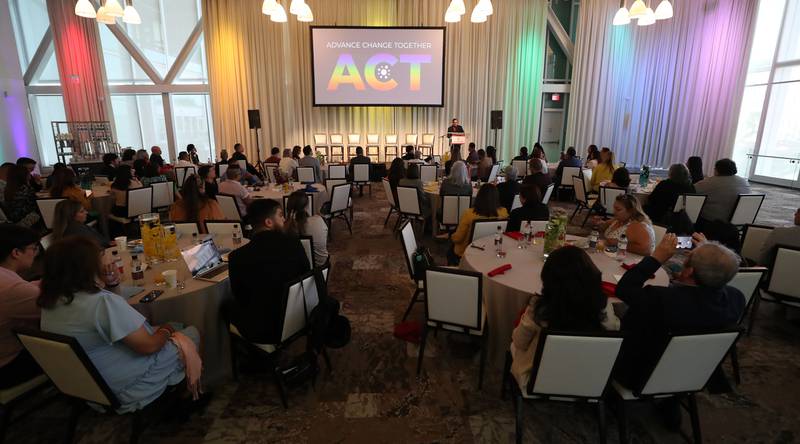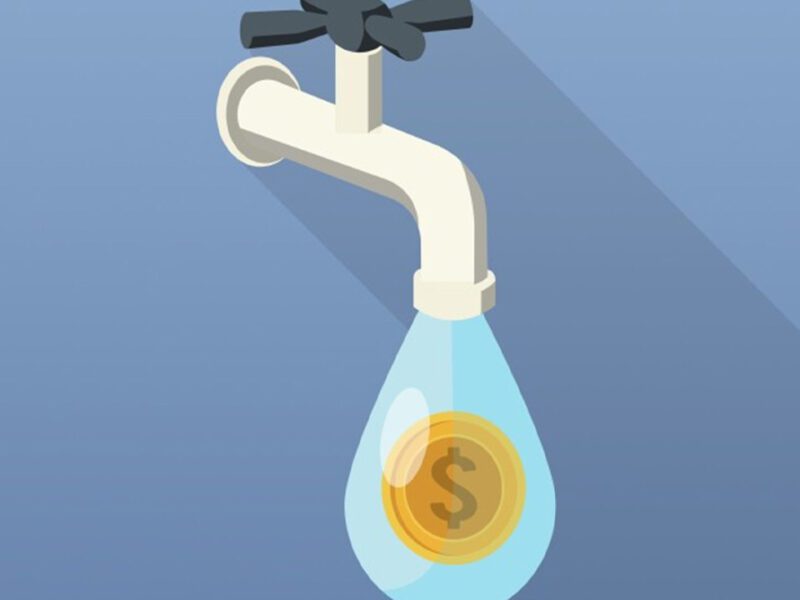Lin-Manuel Miranda joins Hispanic Federation fight for LGBTQ rights with $1 million fund
Kate Santich / Orlando Sentinel / June 14, 2022
Warning of a national wave of “insane” anti-LGBTQ legislation, the Hispanic Federation joined leaders, allies and entertainers in Orlando Tuesday to announce an initial $1 million fund supporting frontline nonprofit organizations that protect the rights of gay and trans individuals.
“It’s not just happening in Florida,” said award-winning composer, actor, director and producer Lin-Manuel Miranda, whose charitable Miranda Family Foundation donated to help launch the fund. “It’s happening in Texas, and it’s popping up everywhere. We need to be there, everywhere they are, with great organization to win this fight.”
The announcement of the campaign — dubbed Advance Change Together, or ACT — was made at the Dr. Phillips Center for the Performing Arts, just yards from where tens of thousands of mourners gathered six years ago at a vigil for 49 people murdered at Orlando’s Pulse nightclub. Most of them were Latinx and LGBTQ.
But despite the global outpouring of support in the immediate wake of that mass shooting, speakers noted, a growing number of states are restricting LGBTQ freedoms, especially for trans youth.
“I am Ricky Martin. I am Latino. And I am a US citizen. I’m a father. I am a husband. And, by the way, I’m also gay,” said the Grammy Award-winning singer and songwriter, appearing via Zoom. “The last one should be enough to make sure that my basic human rights are protected and respected. But they’re not. … I want all children to be able to speak openly about their own families, not to be prohibited from drawing their own family tree at school — just because of the state we live in.”
His comment was a reference to Florida’s new “Parental Rights In Education” law — dubbed “don’t say gay” by critics — which bars classroom discussion of sexual orientation and gender identity in certain grades or when considered age-inappropriate, a standard the law does not define.
Frankie Miranda, the Hispanic Federation’s first gay president and CEO, said the law is one of more than 300 that have been introduced in states across the country so far this year targeting LGBTQ children and adults.
“For me, this is personal,” he said. “I grew up in the kind of environment that ‘don’t say gay’ wants to maintain, where queer children can be bullied and abused and have no one to turn to. … These laws don’t protect children; these laws make them more vulnerable.”
State Rep. Carlos Guillermo Smith, D-Orlando, called the law part of a “homophobic and transphobic” agenda passed to score points with certain conservatives.
“We’re already seeing the consequences of ‘don’t say gay’ happening now, whether it be through school districts wanting to cover up [photos of] protests against the bill in school yearbooks or valedictorians in Florida being told that they cannot talk about gay and trans issues during their graduation speeches. [And] it’s being replicated in other states across the country who are engaged in this race to the bottom.”
Though an increasing number of school districts are banning books dealing with sexual orientation and gender identity, Smith said it’s critically important for queer youth to see others like themselves depicted in art and literature “as healthy and normal residents who participate and exist in all of our schools and in all our communities.”
Researchers have found that LGBTQ youth are much more likely to attempt suicide than their peers.
Most of the legislation introduced or passed in other states has targeted bathroom use by trans and gender-nonbinary students or their participation in competitive sports. But there is also a growing movement to restrict the medical treatment of trans youth.
The Alabama “Vulnerable Child Compassion and Protection Act,” for instance, makes it a felony to provide gender-affirming medical care — including hormone treatment and puberty blockers — to minors. The bill also requires teachers and school employees to inform parents if a student’s “perception of his or her gender or sex is inconsistent with the minor’s sex.”
In Florida, state Rep. Randy Fine, R-Palm Bay, has said he will sponsor a similar bill next session. Fine said his proposal would make providing drugs or surgery to a minor for the purpose of gender reassignment an act of felony child abuse punishable by prison and/or the loss of a medical license. He said the bill would not affect “mental counseling” for minors.
The American Medical Association has called gender-assignment care, including puberty-blocking drugs and hormone treatments, “medically necessary” and said state lawmakers’ attempts to interfere are “a dangerous intrusion into the practice of medicine.”
Banning the practice, the AMA said, would significantly heighten the risk of suicide from “societal stigma and discrimination.”
Florida’s surgeon general, Dr. Joseph Ladapo, has criticized the AMA position, claiming that evidence supporting these gender-affirming treatments is “low quality,” and the administration of Gov. Ron DeSantis has taken initial steps to end Medicaid coverage of such care for people under 18.






